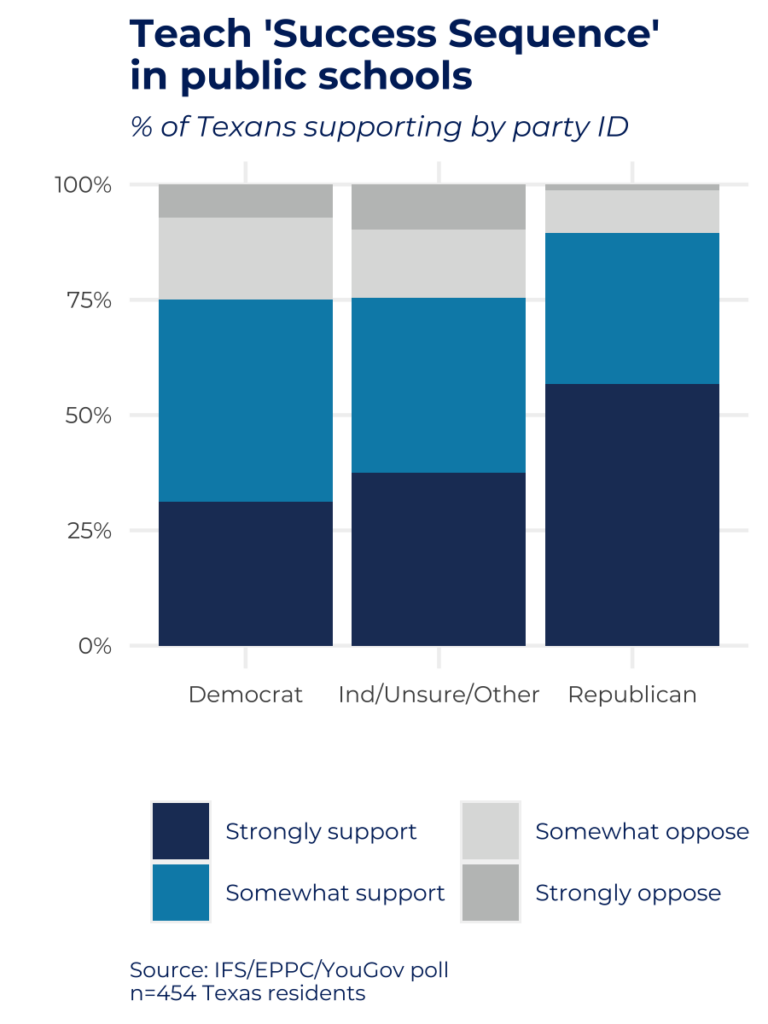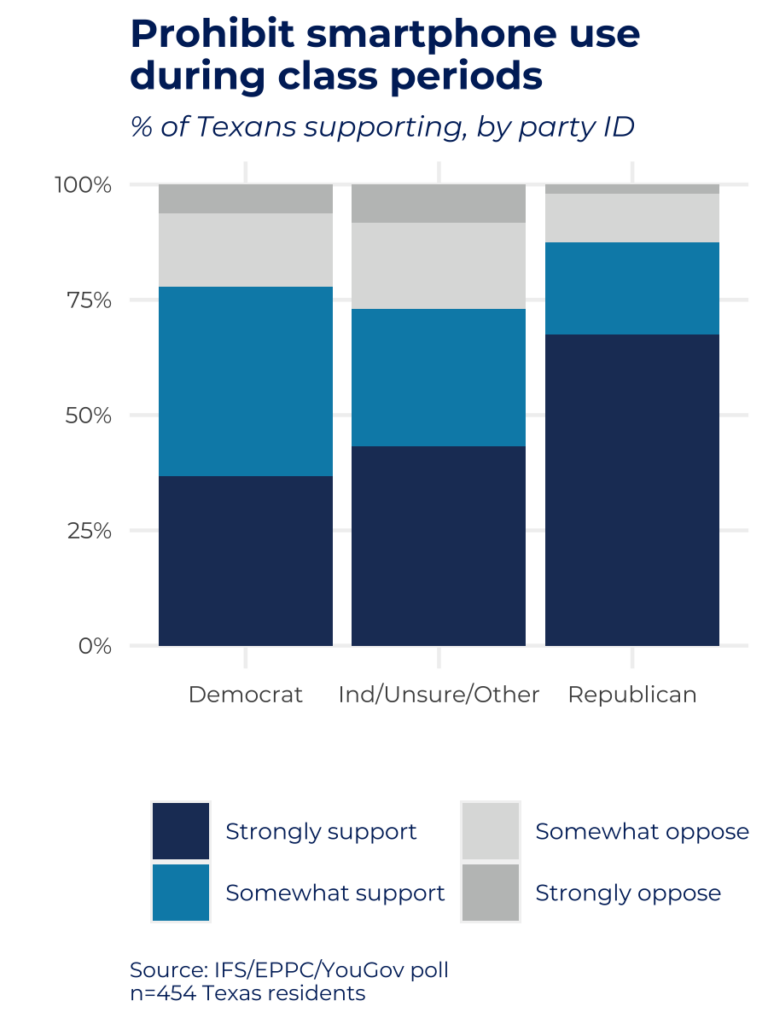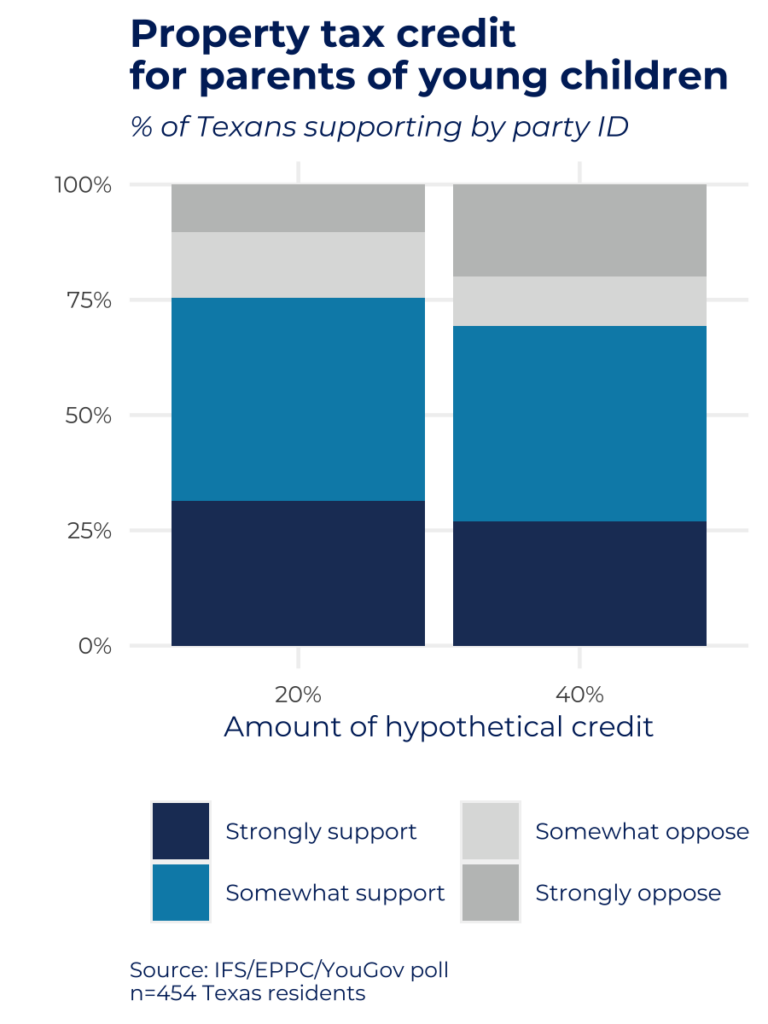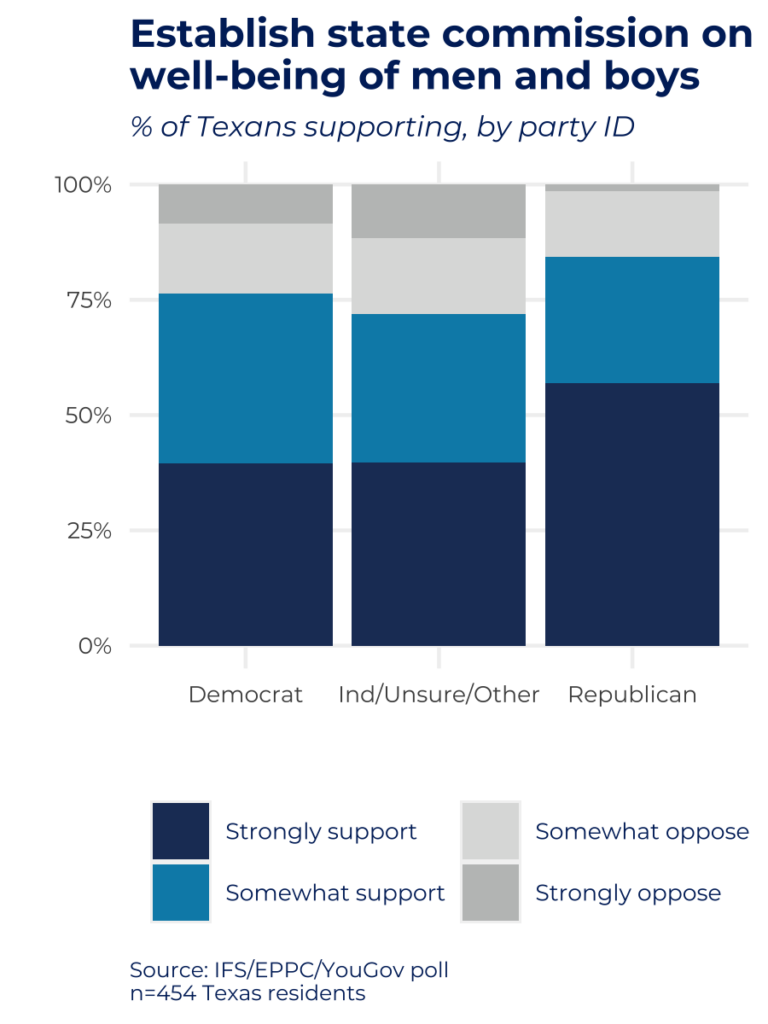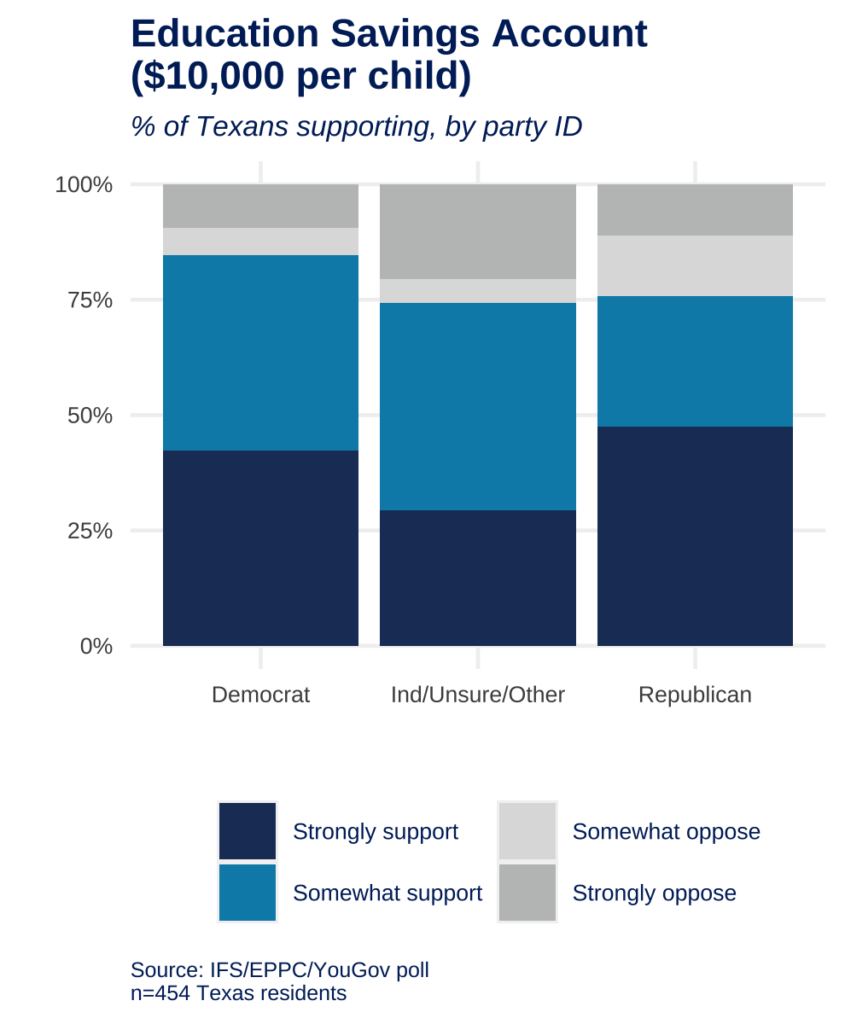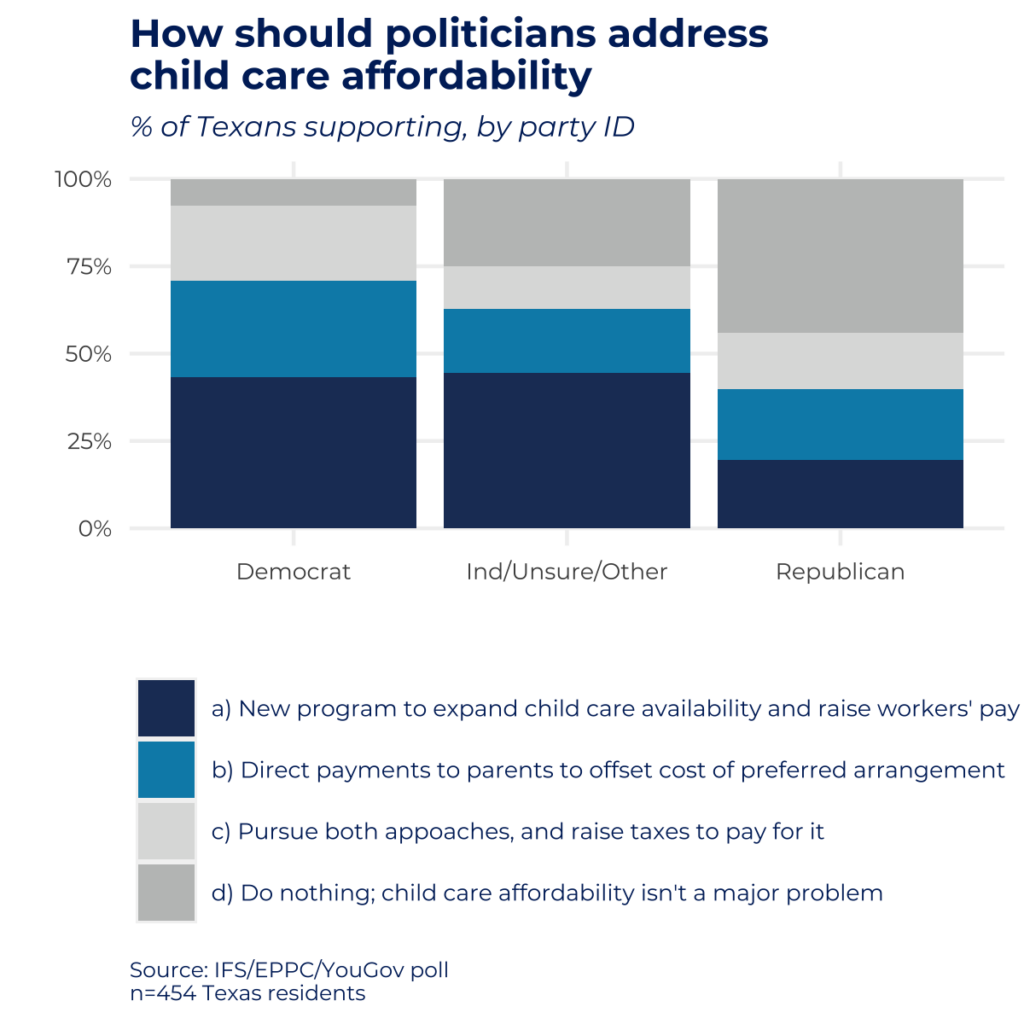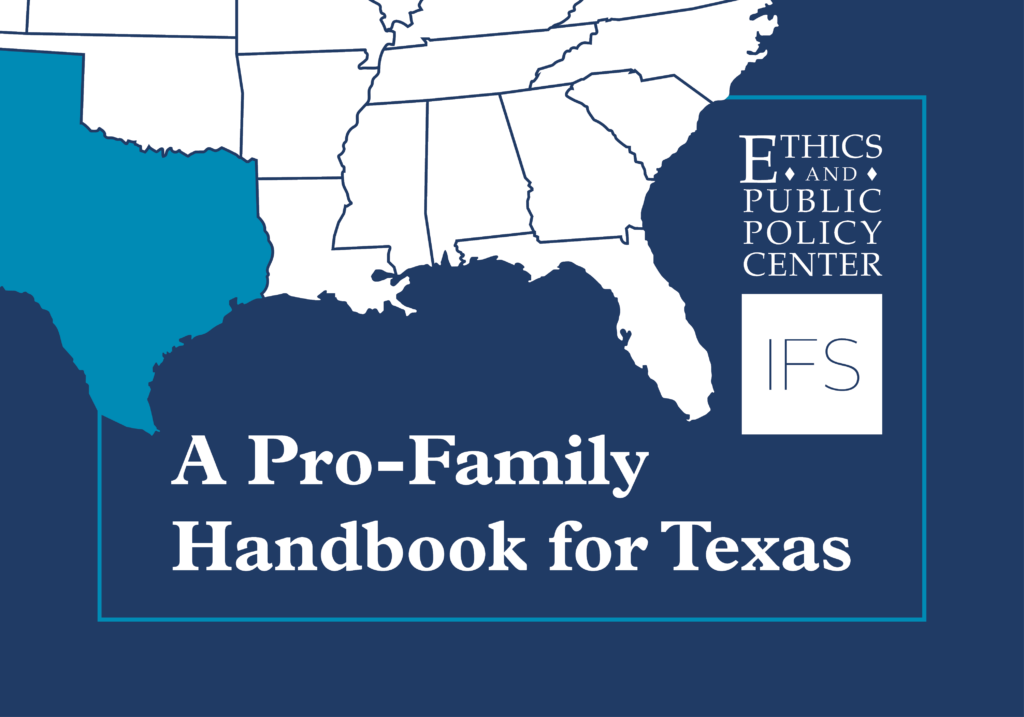
Published February 1, 2024
Introduction
Everything is bigger in Texas—including its success in attracting families, its economic dynamism, and its potential to provide parents with the ability to raise children in the way they deem fit. Texas remains among the fastest-growing states in the union and an affordable place to have and raise a family.
But success can’t rest on its laurels. Families in Texas are not immune from the cultural pressures that concern parents, or the economic realities that make raising children more expensive than it needs to be. Keeping the Lone Star State one of the best places in America to raise a family requires concerted action focused on what parents say they need most from policymakers.
The Institute for Family Studies (IFS) and the Ethics and Public Policy Center (EPPC) recently commissioned a poll from YouGov, asking adults in five growing Sun Belt states about their views on policies that aim to support family life. This report focuses on policies for Texas that are not just politically popular but also can meaningfully advance the goal of making it easier to start and raise a family.
The five pro-family policy priorities highlighted in this report are:
(a) Reorient school curricula to focus on long-term well-being
(b) Ban smartphone use during class time in public schools
(c) Implement a state property tax credit for parents with young children
(d) Create a state commission on the well-being of men and boys
(e) Expand educational options for all parents
Reorient school curricula to focus on long-term well-being
79% of Texas respondents support teaching the ‘Success Sequence’ in public schools
As young people increasingly delay, defer, and opt out of marriage, studies find commensurably lower levels of happiness, and higher rates of loneliness, depression, and suicide. Marriage rates in Texas have been declining, as they have throughout the United States. As recently as 2000, there were 9.4 marriages per 1,000 Texas residents, 15% above the national average. By 2019, the marriage rate in Texas had fallen by half. After a post-Covid bump, the rate stood at 5.7 per 1,000 Texans in 2021 but was still below the national average.
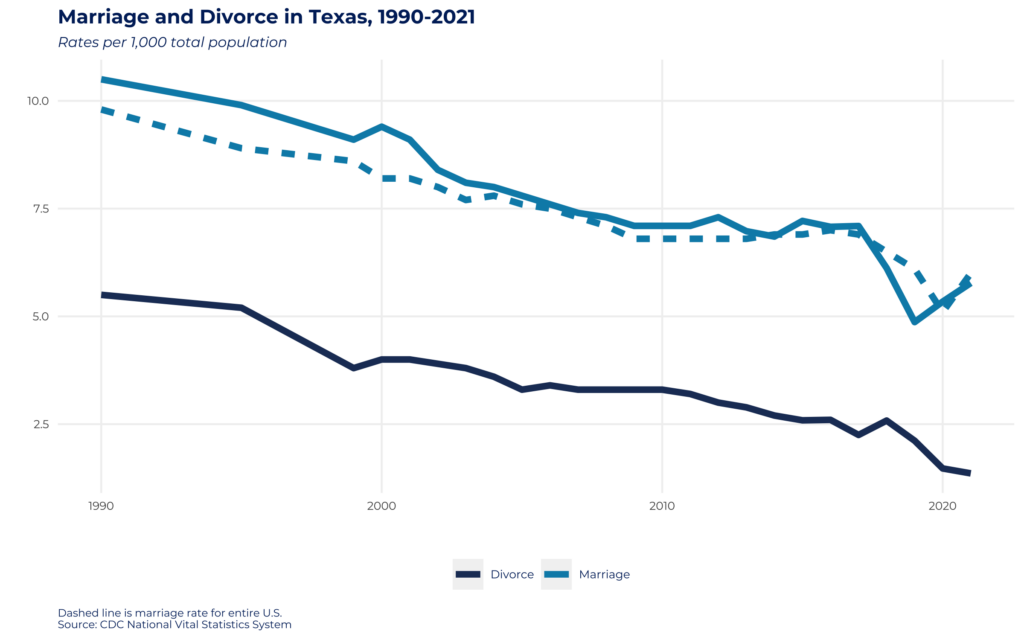
As social scientists have pointed out, certain habits and decisions are associated with long-term flourishing. Specifically, young adults are “60% less likely to be poor if they put marriage before the baby carriage.” Likewise, “97% of young adults who get at least a high school degree, work full time, and marry before having children avoid poverty in their late 20s and early 30s.” To help its citizens flourish, the state of Texas should embrace its responsibility to inform young people about these statistics, and encourage them to think about the long-term trajectory of their lives in ways that go beyond career readiness.
Preparing young Texans for the economy of the twenty-first century is important, but it is even more important to equip them to think about building strong families and healthy futures in an environment that is increasingly hostile to family life.
This approach is broadly popular. We asked Texas residents in our survey their opinion of a “proposed requirement that all public schools teach the ‘Success Sequence,’ the idea that young people who graduate from high school, work full-time, and marry before having children are more likely to avoid poverty and be financially successful later in life.” We found that 79% either somewhat or strongly supported it, including 90% of self-identified Republicans, 77% of Hispanics, and 79% of parents.
To accomplish this fuller vision of education—as about more than just test scores, but equipping students to live a rich and meaningful life—the Texas Education Agency could be directed to require that state educators incorporate a family life standard into curriculum standards that would teach that:
- A high school graduation, full-time work, and having children after marriage are linked to less poverty and greater prosperity for adults.
- Sequencing marriage before parenthood is associated with greater family (and thus financial) stability
- A stable, married family is linked to better educational, social, and emotional outcomes for parents and children, many of which are associated with more positive financial outcomes.
It could also include basic facts about fertility, work-life balance, home economics, happiness, and human flourishing. These would prepare students to think about their long-term goals, including preparing to form families as well as seek out meaningful work. And informing students in high school about fetal development, such as when a heartbeat is detectable or when a fetus’ fingerprints form, could help provide richer and better-informed debates around abortion in the state.
These topics could be incorporated into the state’s recently introduced, half-credit high school graduation requirement in personal financial literacy, or used to supplement the required units of career-focused electives.
School districts could also be directed to collect student academic data by family structure, in addition to race and other demographic characteristics, to give researchers better insights into the value of a stable home environment on student achievement.
Ban smartphone use during class time in public schools
78% of Texas respondents support banning smartphones during class periods
Teens and young adults report rising mental health problems, show declining educational outcomes, and speak openly about the pressures caused by a life intermediated by social media. Lawmakers should act to give Texas children and teens a little more space from the electronic sphere by banning the usage of smartphones during class periods at public schools.
Our survey found that 78% of Texans support banning smartphones during class periods. This ban has support across the political spectrum: 68% of Republicans strongly support the idea, and another 20% somewhat support it; 78% of Texas Democrats, and 73% of those who don’t affiliate with either political party strongly or somewhat support the proposal.
Such a plan could include requiring schools to furnish a safe location for smartphones to be stored during class periods, or simply specifying that students may not be allowed to use phones during class periods without a teacher’s permission. It should also empower school districts to implement various strategies to enforce such a ban.
Texas can take additional steps to protect kids online by giving parents more tools to help their kids navigate the internet safely. The legislature took an important first step in passing legislation requiring internet users to verify their ages before accessing pornographic content last year.
The state shouldn’t stop there. Asking individual parents to be an expert on the plethora of user settings, filters, and options for keeping age-inappropriate content away from their kids places an undue burden on families. Policymakers should reset the status quo around kids and tech with a comprehensive approach to giving parents more power to protect their kids online.
Lawmakers could require that all social media platforms and other websites that allow minors to open profiles first obtain the explicit and verified consent of a parent or legal guardian. They could also require that all social media platforms give parents administrator-level access to view what content their children are watching and who they are communicating with.
In our survey, parents were largely split between prioritizing measures that would require a parent’s permission before children could open a social media account or requiring tech companies to give parents more tools to filter or limit access to certain content. But among the parents we polled across the five states, only 17%—and 12% of Republican-leaning parents—said the problem of helping navigate kids and tech use was “not a problem government should try to solve.”
Implement a state property tax credit for parents with young children
Three-quarters of Texas respondents support a 20% property tax reduction for parents
Fertility rates in the U.S. have been declining since 2007, and Texas is no exception. Even as the state’s population grew from 23.8 million in 2007 to 29.5 million in 2021, the number of births in Texas over that time dropped from 407,625 to 373,594. The state’s fertility rate—the number of births per 1,000 women ages 15-44—dropped over 30% during that time, a steeper trend than the national average.
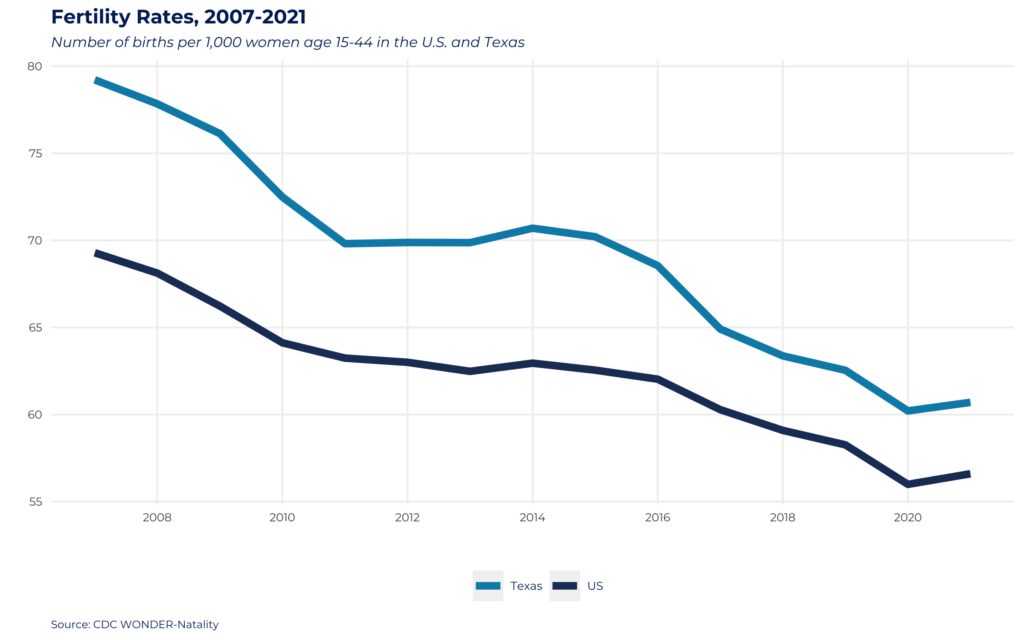
This demographic reality should encourage Texas lawmakers to focus on targeted relief for families with young children. While proposals such as a state Child Tax Credit or a paid leave program are probably political non-starters, there are other tools available for Texan policymakers anxious to make it easier for new parents.
Research demonstrates a clear linkage between house prices and fertility rates. As real estate prices rise, homeowners feel wealthier, and are more likely to have a child. Renters, on the other hand, feel relatively poorer, and on average become less likely to have a child. A targeted intervention making it easier for parents of young children to afford a home could increase the likelihood Texas families would feel comfortable taking the plunge and having a child.
The state of Texas recently increased its homestead exemption for state property taxes from $40,000 to $100,000. This across-the-board exemption will reduce property taxes for homeowners, but it does nothing to specifically address the pressures on parents. When families have a child, their earnings often dip or become less predictable—but they also often require more space for their newest family member.
Allowing parents of young children (ages 0-5) to take a 20% reduction on their state property tax credit would put more money in the pockets of parents at a time when their expenses are high. By focusing on families with young children, it would materially benefit those having children while limiting the fiscal impact of this new provision. Among Texas homeowners, roughly 7.5% have children under the age of 5, so the long-term impact of a 20% credit for these households would be fairly modest.
While we tested both a 20% and 40% property tax credit for parents of young children, the 20% had stronger numbers especially with Democrats and political independents. The level of “strong” opposition was twice as high for the 40% credit as for the 20% credit, suggesting some unwillingness to make a family-oriented tax credit too generous. Furthermore, 72% of Republicans, and 85% of Republican respondents who did not own their own home, strongly or somewhat support this approach.
Create a state commission on the well-being of men and boys
76% of Texas respondents support a commission on men’s educational and workforce outcomes
Young men are now less likely to graduate from high school or college than women. Men, especially single or divorced men, are more likely to die from suicide or opioid-related causes. And these social dynamics contribute to delayed marriage, deferred parenthood, lower labor force participation, and a rising share of young men who are categorized as neither working, nor in education or training.
The cultural and economic factors driving these trends can’t be solved overnight. But a state Commission on Men and Boys would offer a focused, serious endeavor to rejuvenate policy and cultural efforts aimed at helping at-risk young men mature into their place in society.
In general, there was broad support for this kind of concerted action. Roughly three-quarters of Texas adults somewhat or strongly supported the proposal of a new “state commission that would study the well-being of boys and men, and promote policies that encourage healthy masculinity and responsible fatherhood.” Furthermore, 84% of Republican and 76% of Democratic respondents somewhat or strongly supported the idea; 72% of the politically unaffiliated or independents did the same. And 90% of Black respondents and 75% of Hispanics were in support as well.
The Commission would look across the lifespan but focus on young and middle-aged adults who are struggling the most today. It would focus on cultural, educational, job, and social supports, and address policy issues such as reforming child support and alimony. Its efforts would include programs to reduce the number of absentee fathers, working with religious and non-profit organizations to develop outreach efforts to ensure dads have a relationship with their children. It would also be tasked with identifying opportunities to realign and re-envision career and technical education, often referred to as vocational ed, to ensure that all high school students, even those who don’t attend college or university, are given the tools they need to build a pathway to the middle class.
Part of this commission’s work would include a focus on the declining state of marriage in Texas. This has long-term ramifications, particularly for young men who are more likely to grow up without a positive male role model in the home. Kids who grow up without two parents present are at risk for higher rates of academic struggles, health complications, involvement with the justice system, poverty, and other factors associated with social breakdown.
Part of the commission could also be tasked with evaluating the extent to which marriage penalties in state safety-net programs are discouraging young men from marrying. Fully solving marriage penalties is expensive and best pursued at the federal level. But the state could explore taking steps towards reducing the impact of marriage penalties on low-income households by, where possible, easing the sharp cliffs that make getting married a financial loser for too many parents. Offering a honeymoon period, where newly-married couples are able to maintain safety-net program eligibility for a year or two after marriage, could also help families adjust without abruptly cutting them off of benefits.
Expand educational options for all parents
78% of Texas respondents favor Educational Savings Accounts
The state of Texas has been engaged in a debate over whether or not to introduce education savings accounts (ESAs), which would give parents a set amount of money that could be used on private school tuition, tutors, uniforms and other approved educational expenses.
Policymakers should make it possible for more families to seek out the educational environment that is right for their children. And such an approach is popular—we tested $5,000 and $10,000 education savings accounts, and the larger amount performed better with most groups. Half of Republicans strongly supported a $10,000 ESA, while over 80% of Democrats somewhat or strongly supported it.
Ensuring that more parents have more options for their children’s education should be a goal. But expanding choices across early childhood, as well as K–12 education, can make life easier for parents. We know that in early childhood, parents’ preferences vary widely; some prefer to have a parent at home full-time, others prefer to have a relative or neighbor watch their children while parents work full- or part-time, still others prefer a faith-based or for-profit child care center. To the greatest extent possible, policymakers should try to expand parents’ options in early childhood, rather than assuming a one-size-fits-all approach.
Despite much discussion about the so-called “child care cliff,” we found a large partisan gap in how Texas policymakers should address child care, possibly reflecting this diversity in preferences. Nearly half of Republicans (though a smaller share of Republican parents) said that child care affordability was not a “major problem.” Therefore, solutions that allow the child care market to work better, rather than rely on large state interventions, will not only be popular but could enable more parents to find the child care situation they prefer.
According to a national poll conducted in late 2020 by the Bipartisan Policy Center, 31% of working-parent households used center-based care, and of those, 53% used one that was affiliated with a faith organization. One-third of parents participating in center-based care said the religious orientation of the facility was “somewhat” or “very” important in their decision, according to a government survey.
Therefore, any discussion of child care in Texas should include a focus on ensuring faith-based providers an essential part of the delivery system. Additional grants to non-profit and religious organizations can help get a child care program off the ground, or technical assistance to ensure compliance with regulations and requirements could help them build out enough capacity to break even. Similarly, churches or community groups interested in expanding K–12 education could benefit from a start-up grant or technical assistance for ensuring that true choice is available to more families. This attempt at capacity building would help ensure a pluralistic landscape for Texas parents to find the early childhood and K–12 option that is right for them, without putting a thumb on the scale of center-based child care or other options.
Grounding Our Understanding of Pro-Family Policy
Discussions of “pro-family policy” rub some observers the wrong way. On the left, some would prefer to “abolish” the nuclear family; on the right, some believe that active intervention on behalf of families is a distortion of the free market and a precursor to government intervention elsewhere.
But strong families are the cornerstone of a healthy society. From Alexis de Tocqueville onwards, many have observed that the success of the American experiment itself can be said to depend, in no small part, on strong and stable families.
Strong families are correlated with lower crime rates, and lower crime rates are associated with less interpersonal violence, increased academic achievement, higher lifetime earnings, and a whole host of positive social indicators. Indeed, recent research tells us that nothing better predicts the health of the American Dream, at the community level, than the share of two-parent families in a community. Likewise, other recent research finds that nothing better explains the declining share of men and women succeeding in that quintessential American pursuit—“the pursuit of happiness”—than the falling marriage rate. As the family goes, so goes the United States.
The aim of family policy, then, should be to strengthen and stabilize American family life. Among the principles that should be advanced by a robust pro-family agenda are:
- Seeking to strengthen the institution of marriage and the enduring relationship between mothers, fathers, and their children that forms the core of family life.
- Ensuring that children and their parents receive the care and social support they deserve to enjoy a healthy start to life.
- Acknowledging the out-of-pocket and opportunity costs associated with becoming a parent, and advancing policies that would make having children more affordable and achievable.
- Developing policies that create flexibility for parents without jeopardizing their financial security, allowing more families to find the work-life balance that is right for them.
- Remediating imbalances in tax and safety net policies, recognizing the family as an economic institution, and ensuring married families are not penalized relative to single or cohabiting parents.
- Respecting and promoting the fundamental right of parents to raise their children according to their faith, values, and beliefs.
Starting with the family as a core and integral building block that makes up a flourishing society means recognizing that no two families are alike; parents face a variety of trade-offs, different preferences, and changing work and household situations. Parents with a college degree, for example, are much more likely to favor center-based child care compared to those without; but some approaches to child care presume center-based care should be the preferred model for all. Government policies that prescribe a one-size-fits-all approach to questions of work-life balance or the care of young children misunderstand the heterogeneity of parents’ preferences and can ultimately undermine the autonomy of the family.
This means standing up for families against universalist approaches that assume the state should take over the responsibilities that parents bear. But it also means standing up for families against the pressures of a market economy. Pro-family policy does not mean making families more accessible to employers, or assuming the highest goal is increasing labor-force participation. Many parents, especially when their children are young, prefer to work part time, or to take some time out of the labor force. But many proposed social programs are structured in a way that assumes both parents will be full-time workers, or are sold as a way to achieve greater attachment to the labor force. Policymakers must become comfortable with the idea of creating space for families—particularly those who have just given birth—away from the demands of the market, and recognize that, at times, this will require prioritizing the needs of the family over the needs of the labor market.
Policies that expand choices for parents, giving them more options and ability to raise their children in the way they deem best, are authentically pro-family. So, too, are policies that seek to shore up the institution of marriage and increase the share of children raised by two parents. Policies that treat family structure as incidental, or that seek to outsource the responsibility of caring and raising children to the institutions of the market or state to the greatest extent possible, do not merit that definition.
Patrick T. Brown is a fellow at the Ethics and Public Policy Center, where his work with the Life and Family Initiative focuses on developing a robust pro-family economic agenda and supporting families as the cornerstone of a healthy and flourishing society.
